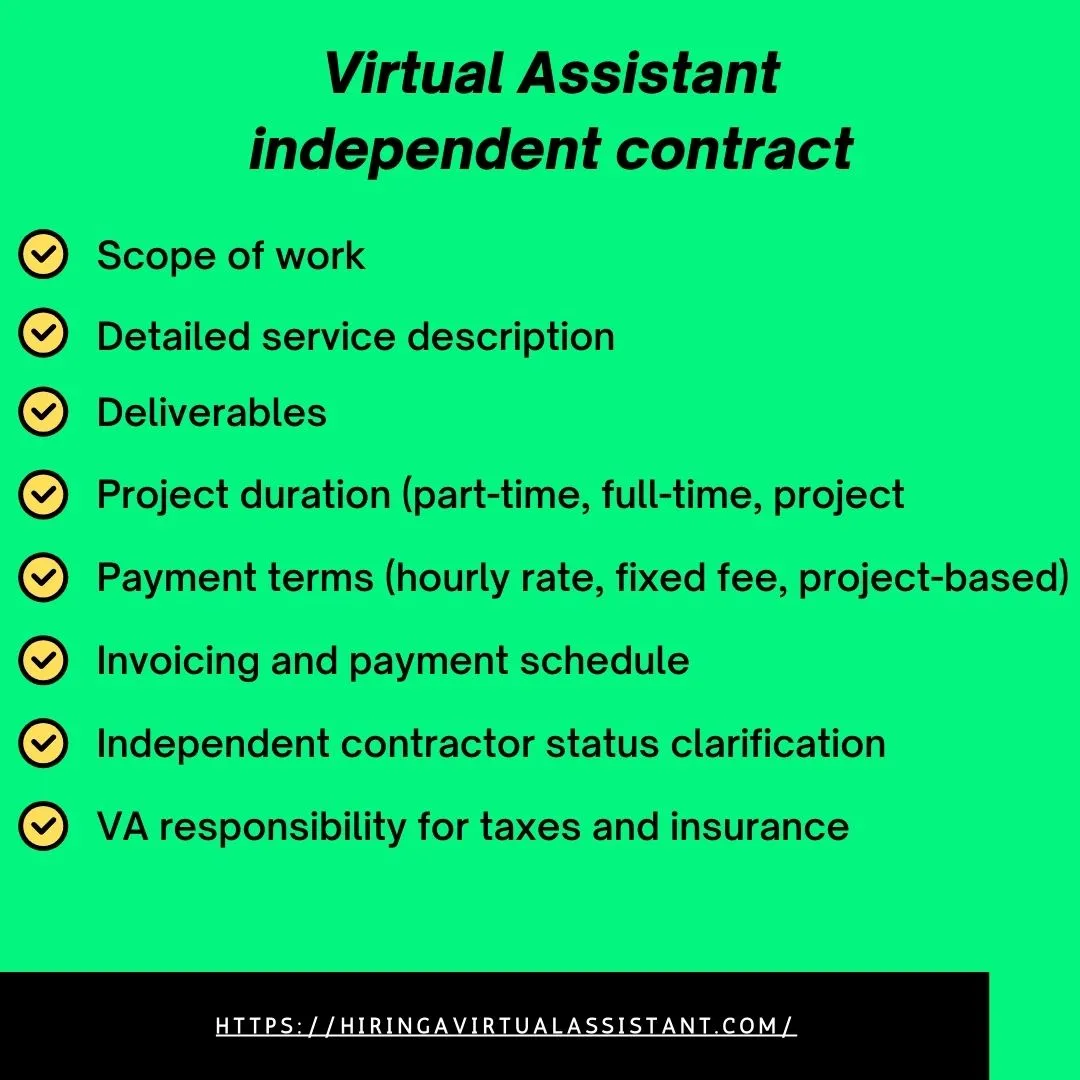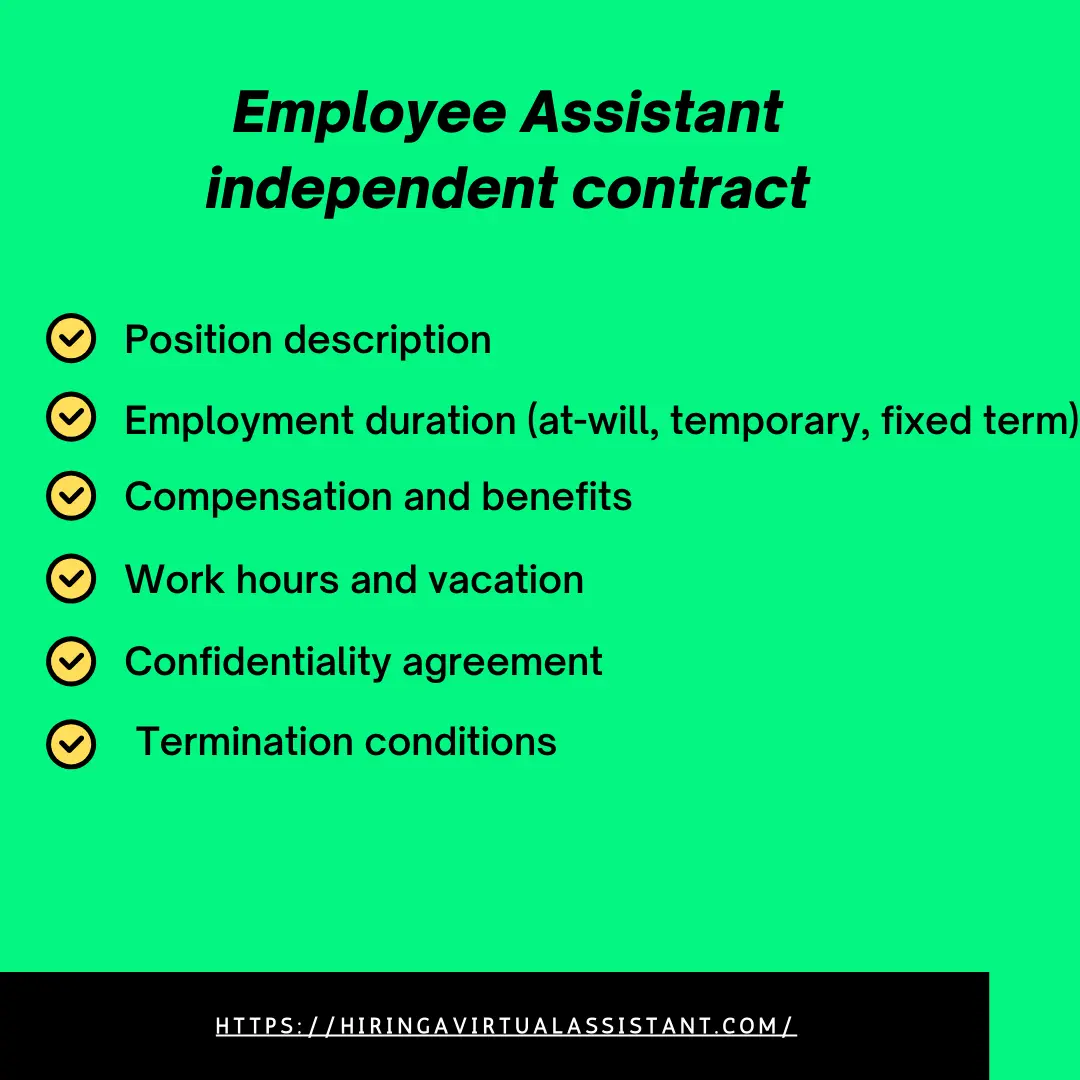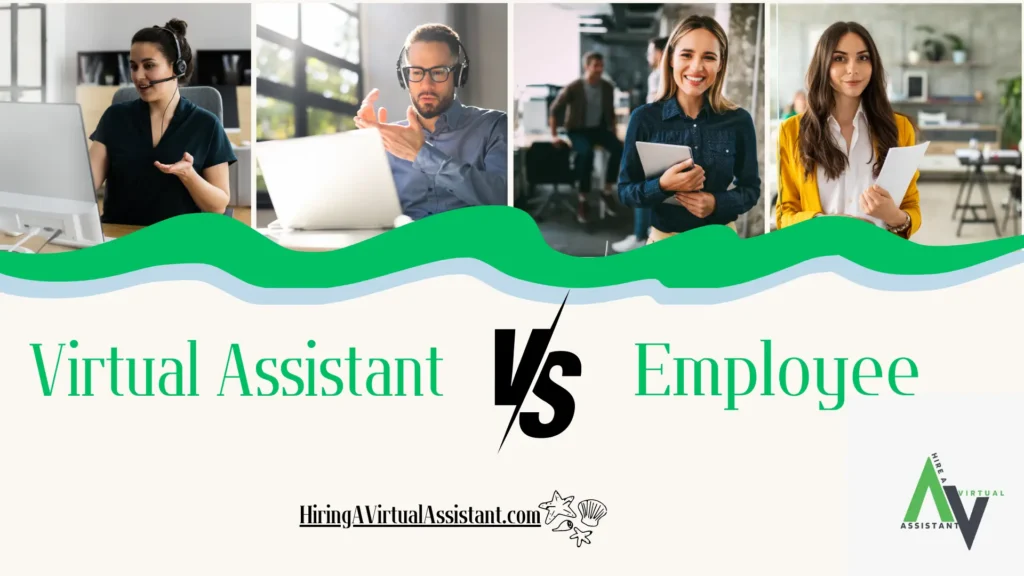Where a virtual assistant works from a remote location, facilitating owners with affordability and flexibility, an employee works by physically presenting in the office like any other traditional office worker.
Though their availability, working environment, and style are far different, this still raises a debate about who is more beneficial. This comparison actually does not make any sense because businesses can hire both on an as-needed basis or choose one.
VAs are for those who have limited resources or need a seasonal helping hand. Employees are there to fully support office work or specific responsibilities and strictly maintain office working hours.
The comparisons are clear, but they still need more in-depth discussion so you can choose if you need both or any particular one.
Let’s compare what sets them apart, like responsibilities and payment, and then some specific advantages and disadvantages, with tips on which to hire.
Virtual assistant vs Employee: What are the Main Differences?
The main difference between a virtual assistant and an employee is their work environment; one works virtually, and the other works physically, respectively. Also, when it comes to salary structure, VA is flexible with payment on an hourly, project, or contract basis. But employees need full salary with additional facilities.
However, let’s see the core difference. This is not going to help the business owners, also the individuals who wants to pursue a career but can not decide what to become.
Responsibilities & Expertise
Starting with the virtual assistant responsibilities, they are mainly known for handling time-consuming administrative tasks. Businesses mostly hire VAs to reduce the burden of repetitive tasks so the team can focus on core responsibilities.
However, VA’s skill sets and expertise are expanding rapidly over time, and they are working on specific niches or more important responsibilities. Say, for example, you need help with affiliate marketing, an expert affiliate marketing VA can be your partner.
There are more virtual experts on digital marketing, logistics, Airbnb managing, SEO, QuickBooks, cold calling, real estate, and many more, whichever you need.
In contrast, an employee can also be an expert in different responsibilities, and employers hire them based on their needs. They can be skilled in different responsibilities like a VA, and sometimes more.
For example, companies may hire employees for leadership, team management, sales, marketing, strategic thinking, and problem-solving. The scope of responsibilities is not fixed and depends on business needs.
These traditional workers, unlike VAs, need to communicating with coworkers, managers, and clients. They work in a team to achieve a specific goal. Also, strictly follow company policies, ethical standards, and legal regulations.
What type of expert does your business need? Both the VA and the employee are experts in several skills, and you need to find the right one.
Location
Now, the core comparison comes that is the location of the virtual assistant and the employee, which will help you 60% to take the right decision.
You already know that a VA works from a remote location, and as an employee, they need office space.
Here, you need to understand your business condition. To be more specific, do you have extra office space for additional workers? Because small businesses or entrepreneurs have limited resources, where the VA is the perfect match. But for large scale businesses, there is no limited space, and they can hire more employee how much they need.
One point to be noted is that the physical presence of employees can facilitate easier collaboration and supervision for roles that benefit from direct interaction or when sensitive materials are involved. For virtual assistants, you need to invest in digital tools and platforms for effective communication and project management.
Contract
Virtual assistants are independent contractor, but an employee need to stay in a employee contract provided by the employers.
Being self-employed, VA operates independently and is not an employee of the client. This impacts tax obligations, benefits, and the level of control the business owner or client has over the VA.
A virtual assistant independent contract includes,

- Identification of the client and the virtual assistant.
- Scope of work.
- Detailed description of the services.
- Deliverables.
- Project duration, part-time, full-time, project, or contract basis.
- Hourly rate, fixed fee, or project-based payment and the schedule for invoicing and payment.
- Clarification that the VA is an independent contractor and not an employee, which affects tax obligations and benefits.
- Statement that the VA is responsible for their own taxes and insurance.
- Intellectual property rights.
For an employee, there is a fixed contract that he needs to sign on mutual agreement. The employer or HR provides the contract that highlights all the terms and conditions, such as,

- Identification of the employer and the employee.
- A detailed description of the position.
- Duration of employment, whether the employment is at-will, temporary, or for a fixed term.
- Compensation and benefits include salary, bonuses or incentives, health insurance, retirement plans, paid leave, and any other employee benefits.
- Working hours and vacation.
- Confidentiality Agreement
- Termination conditions.
Cost Comparison
VAs are flexible to hire as they charge only for the work done, often on hourly basis. Thus they always work within their allotted budget and do not add in companies payroll system. Also, a virtual helper use their own equipment and supplies and need minimal to none training. This also cost-effective for most businesses.
An employee is charged a full salary from the company, with additional insurance benefits, paid leaves, incentives, performance bonuses, and increments, which can add 30-40% to the salary. These workers need equipment like computers, software, office supplies, etc., with initial and ongoing training, which incurs costs.
The VA is more profitable option as there is no additional overhead cost.
Working Hours
There are no fixed working hours for remote workers, as they work on a client-needed basis. Some may work for a couple of hours, or others full day long. There are some VAs who provide customer service around the clock.
An employee has fixed shift hours, which may be 7 to 9 hours. They are bound to work in this time frame, and any late entry, delay, or overtime impacts their salary.
Control
Individuals love this virtual assistant profession because of the self-management feature. However, the remote helpers are independent and manage their own schedules and work methodologies. They have the autonomy to decide how best to complete tasks within the deadlines.
Also, remember the VAs are contracted rather than employed. So, business owners can not bound them by the same rules and regulations that govern in-house employees. With clear boundaries about what their job entails they do not need constant supervision..
But employees need to work under direct supervision, follow specific guidelines and expectations set by their employer. They are more integrated into the company culture and its day-to-day operations. The upper level administrative monitor the work processes, hours worked, and sometimes even the methods used to complete tasks.
Flexibility
A virtual assistant have flexed on working works, scalability, location independence and specialization on demanded skills.
Your VA can work non-traditional hours or adjust their schedules to meet deadlines. Even if your business is on different time zone or extend operating hours, this won’t hamper the work. Moreover, it’s easier to scale up or down with VAs based on the current needs of the business. Thirdly the geographic flexibility let you to hire the best talent at a lower cost if the VA is in a region with a lower cost of living.
As of about the in-house employee, they can collaborate more easily and effectively. For a team environment and more spontaneous problem-solving, being physically present benefits more.
Also, an in-house employee is more loyal to the company with lower turnover rate, makes them another flexible option for companies to adopt.
Data Security and Confidentiality
When hiring employees for a company either virtually or in-house data security and confidentiality are key consideration, that with 1% of careless can risk your company.
With a remote assistant, theoften access company data remotely thus expose data to interception or unauthorized access. If the VAs use third-party platforms and services that aren’t directly controlled by the company can risk of data breaches.
So, with a VA its very important for you to ask the VAs to use VPNs or secure cloud services to access company data. Make sure the data transmissions are encrypted. Or if possible provide data security training.
Since the in-house workers always stay under supervision and under strict contract there is less chance of data breaches. Still to be careful use policies that cover data usage, access controls, device management, and security protocols within the company.
Clearly define and communicate internal procedures for handling sensitive information. Fron the beginning teach them how to securely share, store, and dispose of data.
Ensuring Confidentiality in Both Setups:
- Both VAs and employees should sign NDAs to legally bind them to confidentiality. This is to protect trade secrets and other sensitive information.
- Use encryption for storing and transmitting all sensitive data.
- Regular updates and patch mnagement.
Pros and Cons Virtual Assistant
There is no doubt, hiring an employe who do not need additional finance or space can benefit companies on large scale. But there are some more benefits and disadvantages of a virtual assistant,
Pros
- Virtual assistants typically cost less than hiring full-time employees because they handle their own taxes and benefits.
- VAs can work on a flexible schedule, which is ideal for tasks that do not require a fixed schedule or for businesses that need to cover various time zones.
- Low or no replacement cost.
- Businesses can hire VAs for specific skills or projects.
- Use their own resources.
- Submit reports regularly to keep the clients updated.
- No training cost.
- No need of lengthy HR process to hire.
Cons
- Unreliable to track the working hours.
- Tough to maintain constant communication
- Split focus becasue of having more clients.
- Overseeing work can be more challenging.
Pros and Cons Employee
In-house or traditional employees are right there in the office, which can make teamwork and spontaneous meetings more effective. There’s a lot to be said for the face-to-face interactions that happen in an office setting, with some potential drawbacks,
Pros
- HR can better assess skill, character, and authenticity.
- Stable and consistent work output.
- Keep better track of daily, weekly, and monthly productivity to find out if there’s an area for improvement.
- Easy to effectively fix technical issue.
- Develop better human relations with their team and colleagues.
- Can invest in the long-term growth and training of employees.
- Full-time employees are often more committed to the company’s long-term goals.
Cons
- Expensive and long-term investment.
- More replacement cost.
- Requires investment in recruitment, training, and retention strategies.
- Scaling the workforce up or down is more complex.
When to Hire a Virtual Assistant
Chatting with VAs and integrating them into your workflow can really take the pressure off your in-house team. It’s cost-effective too! How does that sound for fitting into your current business setup? Here is when you should hire a VA.
When You Have Specific Tasks
Think about those tasks that need to get done but don’t necessarily require someone in the office, like scheduling meetings, sorting through emails, or updating your database. A VA can handle these efficiently from afar.
For Short-Term Projects
Got a project coming up that’s important but not permanent? Maybe it’s updating your website, doing some customer surveys, or organizing a virtual event. A VA is perfect for these kinds of projects because you can bring them in just for the duration of the project.
When You Need to Scale Quickly
Here’s where VAs really shine. If you hit a busy season or suddenly need extra hands on deck, you can scale up by adding more VAs to your team. And if things slow down, you can scale back just as easily.
When to Hire an Employee
Bringing someone on board full-time is a big decision. It’s about more than just filling a gap; it’s about investing in someone who will contribute significantly to your business. So, you should consider hiring an employee when,
Thinking Long-Term?
When you’re planning for the future and see a core role that will be crucial for years to come. This s a prime time to hire an employee. These are the folks who will grow as your business grows.
Need Deep Integration
If the role needs deep immersion daily of your business or requires frequent collaboration, a full-time employee can be a natural fit. They’ll be there day in and day out, getting to know the ins and outs of your operations.
What About Your Secrets?
Now, if we’re talking about work that touches on sensitive areas like intellectual property or trade secrets, hire an employee. With full-time staff, you can have a tighter grip on confidentiality and security.
Which is Best for Your Business?
Choosing between a virtual assistant (VA) and an in-house employee really depends on what your business needs most. If you’re looking to save money and need someone flexible, a VA might be perfect. They can work as much or as little as you need, and you don’t have to worry about office space.
But if the job involves confidential stuff or you really want someone who can gel with your team and get immersed in your company culture. Then hiring an in-house employee is probably the way to go. They’re right there with you, which makes it easier to build a strong team vibe.
So, it boils down to what’s more important for your business at the moment, flexibility and cost or security and team cohesion. What fits your current situation better?
Are you interested to read more Special Assistant vs Executive Assistant?
Final Thought
A virtual assistant works from a remote location, specialized in diverse skill set and work for an affordable salary than any on-site employee. Whereas, an employee work in a team for the business growth, and avail all the financial benefits from the company.
Both of these roles have their own advantages and drawbacks, and who to hire actually depends on business need.
For a flexible option, choose VA, and if your business needs face-to-face interaction and work with confidential data, then in-house employees is suitable.

